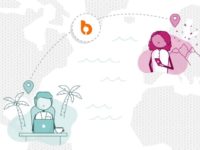Now is the time to start preparing for Generation Z in the workplace.
Depending on which way you slice it, Generation Z, the successors to the millennials, are either just now entering the workplace or have slowly been trickling in for a handful of years now. Mixed reports have the generation starting somewhere between 1995 and 1998. But neither date changes the fact that Generation Z in the workplace will be a force to be reckoned with.
Gen Z will be the largest generation in the workforce. Per data from the consulting firm Bridgeworks, Gen Z contains 61 million Americans, handily contending with other considerably large (and disruptive) generations like the Baby Boomers and millennials.
They are the most diverse generation on record, continuing a long trend of the increasingly blended cultural perspectives in our generational cohorts’ demographics. And, most importantly, they will be arriving in droves before you know it. Today, leaders may only have to deal with a handful of Gen Zers, but by 2020, this cohort will make up 40% of the U.S. workforce. In only two short years, one in every five employees in America will come from Gen Z.
The disruption from Generation Z in the workplace both inevitable and imminent. But the sooner leaders get to know the qualities that make this generation unique, the sooner they can prepare for the changes to come. Here’s what to expect when Gen Z starts shaking things up.
Related: How to Engage Employees From All 5 Generations
Generation Z will ride a tidal wave of change
Generation Z’s professional careers will run in tandem with a mass reconfiguration of the working world. As we previously wrote about the future of work, 47% of all U.S. jobs are at risk of computerization in the next 20 years. Historically, this element has been difficult to discuss because we still do not know the full extent to which automation will transform the climate of work.
However, we do know that automation is not the end for the human workforce. While some jobs will be eliminated by robotic processes, other roles will arise in direct response to manage these systems, or otherwise use human labor in more creative ways.
Automation is not a “one-and-done” thing, though. As it disrupts and reshapes the workplace for many years to come, we will see employees demonstrate increased horizontal mobility across disciplines, teams, and job roles in response. This massive shift will affect all generations in the workplace, but Generation Z will be the first cohort to play this game of professional hopscotch across their entire careers.
Gen Z will still move through professional ranks vertically, of course, and it will be incumbent on them to develop the specialized knowledge and technical skills to propel that mobility. But as firms like Deloitte observe, robotic processes and analytical tools will only grow more robust in form and function. More than any other generation, Gen Z will be forced to demonstrate powerful critical thinking skills and a “mental agility” to endure these radical new conditions.
Professional development motivates Generation Z in the workplace
The Great Recession is perhaps the biggest cultural event shaping the attitudes of Generation Z in the workplace. This generation saw their parents lose their jobs and struggle for years in the wake of the biggest period of economic instability since the The Great Depression.
Early research suggests that as Gen Z enters the workplace, they’ll be looking for stable positions where they can grow and develop. Per Robert Half, growth opportunity is the biggest quality Gen Z looks for on a job search, and 64 percent report this progression as their top career priority.
Thankfully, this generation is also good at telling us exactly how they want those growth opportunities presented to them: mentoring programs. The same research from Robert Half shows Gen Z feels mentoring ability is one the most valuable traits a leader can have. A separate survey from Door of Clubs corroborates this desire to learn. Mentorship programs fall just behind health insurance as the most desirable benefit for Generation Z in the workplace.
But an increased emphasis on mentorship is far from the only way professional development must change for the generation that grew up on Snapchat and Twitter. As we’ve noted before, formal learning systems that leverage micro-learning modules (read: bite-sized content) resonate strongly with younger employees–and that includes millennials, too. Rotation programs, which move employees across different work assignments and locations within a set time frame, may also be useful for preparing Gen Z for a day when that type of mobility is the rule, not the exception.
Their tech proficiency may be a double-edged sword
Generation Z is often referred to as “digital natives.” They’re the first generation to grow up in a world where high-speed internet, smartphones, tablets, and free Wi-Fi already existed. The pain points of dial-up and landlines are but a distant memory for them–if they’re a memory at all.
According to researcher David Stillman, 91% of Gen Z says a company’s technological sophistication will influence their decision to work there. At work, they will expect the software, systems, and team communication tools they use to mimic the intuitiveness and ease-of-use of their personal technology.
If the tech at work isn’t up to snuff, they expect the company to sanction Bring Your Own Device policies (formal or unspoken) to help them pick up the slack. In turn, leaders are expecting Gen Z to demonstrate a greater technological proficiency than millennials, another generation to (somewhat erroneously) carry the digital native label.
One of the stereotypes attached to the digital native label is the idea that these people are somehow more averse to social interaction and have difficulty maintaining personal relationships. But with all generational stereotypes, it behooves us to ask “How much of these assumptions are based in fact?”
Research on the actual attitudes of Generation Z is producing mixed results. One study suggests that despite their proclivity for tech, face-to-face interactions are actually more meaningful for Generation Z in the workplace. More than half of Gen Z respondents reported preferring in-person communication over digital channels. However, other data suggests that this generation actually feels a great deal of anxiety over technology’s role in their lives, even believing it has weakened their people skills.
In either scenario, our stance remains unchanged: human relationships are at the heart of employee engagement. Regardless of whether it is easy or difficult to connect with Generation Z in the workplace, their leaders will need to promote the strong social connections that motivate greater performance.
A word of caution
When it comes to understanding Gen Z, leaders and researchers are only just now dipping their toes in the water. As we wait with eagerness and anxiety to embrace this new demographic, we need to remember that not all generational observations are created equally.
Soon, publications everywhere will be sharing observations about the attitudes of Generation Z in the workplace, but keep an eye out. As we saw with the last decade of thought leadership around millennials, some of the more insidious and pervasive labels characterizing that generation did not stand up to scrutiny. Instead of producing insightful commentary on an important employee demographic, these observations rehashed (and reinforced) the same tired divisions between old and young workers that have existed since Baby Boomers were called the “Me Generation,” and likely long before that.
It’s important that we seek to understand the conditions and qualities that make each generation unique. But these observations should be secondary to the fact that employees are individuals first and members of their respective generations second. If you never take the time to engage them as the former then your efforts engaging them as the latter will fall flat.



 5 min
5 min




